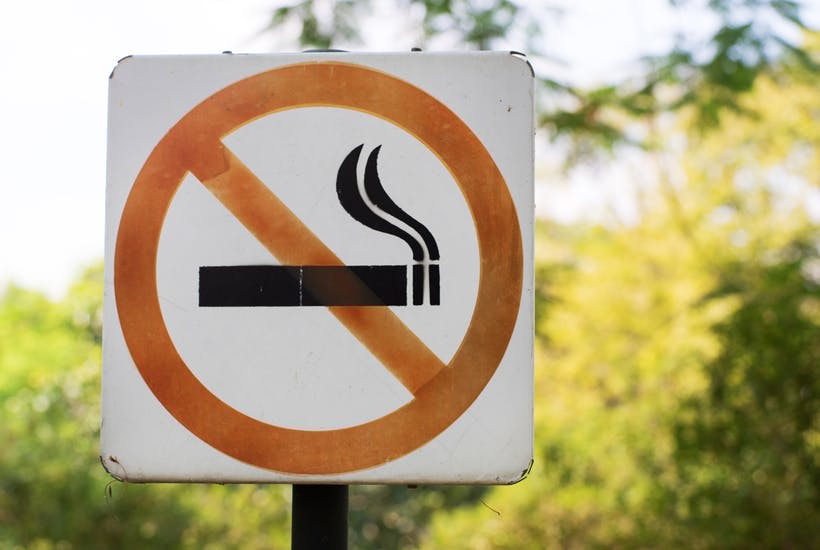It is 10 years since smoking in public places was banned in England. Ten years since officials decreed that we could no longer light up at work, in restaurants, in pubs and even at bus-stops. Ten years since you could follow your Tiramisu with the satisfying throat hit of a drag of nicotine. Ten years since pubs were fuggy and convivial, packed with hoarse ladies telling stories and old blokes propping up the bar rather than shiny-haired new dads wearing a baby in a sling and wondering whether to treat themselves to buffalo wings or mac’n’cheese balls. Seriously. Babies in pubs. I’ve seen it with my own eyes.
I hate the smoking ban. I hate what it has done to this nation. It has ripped out its soul. It has sterilised it, sanitised it, turned this country of the raucous public house and yellowed fingers wrapped lovingly around glistening, gold pints into one massive gastro hangout in which everything is clean and child-friendly and boring.
It has made us cruel. I’ve seen incredibly ill people, twisted into wheelchairs, smoking in the cold, purple air of a winter’s night outside King’s College Hospital in London. And now Public Health England wants to ban smoking outside hospitals as well as in them, presumably meaning the sick will have to traipse or crawl across deadly roads for their two minutes of tiny pleasure. What has become of us?
It has made us a nation of grasses. Or it tried to. The smoking ban was accompanied by the introduction of a Smokefree Compliance Line, with officialdom badgering us to call if we witness a ‘smokefree law violation’ — a euphemism for ‘someone having a fag’. The ‘compliance line’ received 2,342 calls in the first four weeks following the introduction of the ban in July 2007. I weep for Britain.
It made the petty policing of everyday life a normal rather than terrifying thing. Who can forget the government’s promise to send ‘environmental health officers’ — smoke spies — to ‘working environments considered to be at higher risk of non-compliance’. And what sort of environments might they be? ‘Bars and pubs which were commonly used by indoor smokers before the law was passed’, the health tyrants chirped. That is, old pubs, likely full of old duffers, possibly in those non-metropolitan bits of England, where — the horror! — people once enjoyed a puff with their pint. Suddenly such institutions could expect a knock on the door from the Smokefree Stasi. Every generation before ours would have considered this poking of the long snout of the law into the public house an affront to British freedom. Why didn’t we?
This is what I hate most about the smoking ban: the fact that so few people hate it. The fact that it wasn’t met with hordes of angry boozers barricading themselves into their beloved hazy bars or workers insisting on the right to a have a breaktime fag indoors rather than on the street, in the drizzle, like social lepers. Rather, it was greeted with a national shrug of the shoulders. Even as the impact of the smoking ban has become clear — with many researchers arguing that the crisis of the pub industry, especially of old pubs in working-class areas, is partly down to the ban — still we haven’t demanded a rethink. Still we haven’t rebelled and lit up. Yeah, cool, let those social institutions of the poor wither away — that’s been our heartless response. As I say, it made us cruel.
This is the thing about the smoking ban, the really bad thing, the thing that no number of graphs claiming to show that the nation’s health has improved as a result of the ban can justify: it speaks to a historic turning away from liberty.
It speaks to a dramatic backward shift in politics. A shift from a politics concerned with improving people’s living conditions to a politics obsessed with policing people’s behaviour. ‘The politics of behaviour’, as New Labour scarily but aptly called it. It speaks most strikingly to a redefinition of what it means to be left or progressive. Once, that meant ensuring the less well-off had more opportunities, more comfort, more pleasure. Now, as made clear by the mad leftist cheering of the ban and other nanny-state initiatives, it means saving people from themselves. It means depriving people of pleasure for their own good. It means using the law to socially re-engineer the masses so that they’re more like ‘us’: fitter, slimmer, smokefree.
Thirteen years ago, in June 2004, John Reid, then the Labour health secretary, made a plea for pleasure. As Blairites (and Jeremy Corbyn) plotted to ban smoking in public, Reid said ‘be very careful that you do not patronise people’. He reminded his fellow Labourites that smoking is one of the ‘very few pleasures’ some people have. Smoking is far from the biggest problem facing Britain, he said, and yet it has bizarrely become ‘an obsession of the learned middle class’. He was right. But his plea fell on deaf ears, and three years later these learned middle classes imposed their stringent, joyless moralism on the nation. Ten years on, it’s surely time for a fightback — or at least some recognition of the fact that a ban that possibly made Britain healthier also made it nastier, sadder, more prim, and less free.







Comments